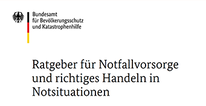Health care proxy, care directive
Information on the living willThe guardianship authority
Tasks of the guardianship authority
The reformed guardianship law came into force on 1 January 2023. The reformed care law has comprehensively modernised legal care. As part of the reform, a new independent law for official tasks was created with the Care Organisation Act (Betreuungsorganisationsgesetz - BtBG).
The duties of the guardianship authority are regulated in Section 1 BtOG.
§ 5 Duties to provide information and counselling on general care law issues concerning powers of attorney and other assistance where no legal representative is appointed.
The authority advises and supports carers and authorised representatives at their request in the performance of their duties.
It supports volunteer carers in concluding an agreement on support and assistance with a recognised care association.
The authority itself must ensure the accompaniment and support of the voluntary carer by means of an agreement if no recognised carers' association is available in its area of responsibility.
§ 6 Support tasks
The authority supports carers and authorised representatives in their tasks and in their further training, as well as the activities of individuals and non-profit and independent organisations for the benefit of those in need of care, as well as providing information and advice on health care proxies, care directives and living wills.
§ 7 Public notarisation; authorisation to issue ordinances
The notary at the authority is authorised to publicly notarise signatures or hand signs on advance care directives and powers of attorney of natural persons and indicates the possibility of registration with the Central Register of Advance Care Directives.
The fee for notarising a power of attorney is 10 euros.
§ 8 Counselling and support services, provision of suitable assistance and extended support
The authority should provide the person concerned with counselling and support services to avoid the appointment of a guardian. The counselling and support also includes the duty to arrange other assistance with the consent of the person concerned and to establish contact as well as to provide support when applying for this assistance and to submit the applications themselves. The authority works together with the responsible social service providers.
In suitable cases and with the consent of the person concerned, the authority may provide extended support. This includes further measures that go beyond paragraph 1, which are suitable for avoiding the appointment of a carer and which do not require the authority to legally represent the person concerned.
§ 9 Notifications to the guardianship court and the home authority
Co-operation with the competent guardianship court and the home authority in the event of knowledge of circumstances that cast doubt on the suitability of a guardian
§ 10 Notification of guardianship associations
Notification of volunteer associated guardians to the guardianship association responsible for them, so that the latter has the opportunity to provide further training and conclude an agreement with them if they so wish.
§ 11 Tasks in court proceedings
The authority supports the guardianship court in clarifying the facts of the case, in making guardianship proposals and in examining the need for guardianship.
§ 12 Caregiver proposal
At the request of the person concerned, the authority can arrange for the person concerned and the proposed caregiver to meet in person.
Applications and forms on the subject of guardianship and health care proxy
Guardianship law in plain language
Healthcare proxy in plain language
What does legal guardianship mean?
This refers to the legal representation of adults who are no longer able to manage their own legal affairs due to mental illness, mental disability or significant physical disability. Anyone who can freely determine their own will may not have a legal guardian appointed against their will.
The decision of the guardianship court on the guardianship order in accordance with German guardianship law is made in guardianship proceedings. This can be initiated by the person concerned themselves or by third parties (relatives, friends/acquaintances, various authorities or services) at the competent guardianship court.
The appointment of a guardian is not necessary if the person's affairs can be managed just as well by other forms of assistance. Other assistance can include family members, neighbourhood help, various advice centres, supplementary independent participation advice or social services, as well as third parties authorised by the person concerned and integration assistance services.
Information on health care proxies, advance care directives, living wills, emergency spouse representation law and voluntary carers
Who will manage my affairs if I am no longer able to do so myself? How can I make provisions in my healthy days?
Anyone can find themselves in a situation at some point where others have to make decisions for them. Under German law, the spouse, partner or children are not automatically designated as legal representatives. In order to make provision for such a situation in healthy days, the various forms of provision are briefly described below.
Lasting power of attorney
In a health care proxy, the author names one or more persons of trust who are to take care of the necessary matters in an emergency. The power of attorney regulates various areas, e.g. health matters (consent to medical measures), official and administrative matters (submitting applications) and housing matters (cancellation and dissolution of a flat).
The authorised person who holds the original power of attorney in their hands is immediately able to act with it and can deal with the matters designated to them. It is always important to authorise a person you know well and trust, as the granting of power of attorney is a kind of private contract. If someone is in possession of a power of attorney, they can use it to deal with all the matters listed therein. But be careful: as a rule, nobody checks whether the authorised representative is acting lawfully or in the interests of the principal.
It is also advisable, but not mandatory by law, to have a power of attorney notarised. You have this option at the local care authority for a fee of 10.00 euros. In the case of large assets, company matters or property matters to be settled later, notarised advice and certification is advisable.
Advance care directive
If the court route of legal representation is preferred, the guardianship court can be informed in a guardianship decree of the wish as to which person should be appointed as guardian in the event of guardianship proceedings and who should not. It is important that the carer only represents a person in matters that the person concerned can no longer manage themselves. The guardianship court must take into account the suggestions made in the care directive. For this reason, it is everyone's duty to submit such a decree to the guardianship court when they become aware of legal guardianship proceedings.
If the person proposed in the care directive is not suitable or willing to take over the care, the care court will select another person, preferably from the person's immediate environment. If no person is available to take over the care on a voluntary basis, there is the option of appointing a third-party voluntary or professional carer.
Living will
The living will documents the wishes of a seriously ill patient in the event that they are no longer able to express themselves. This is an important indication of the patient's presumed wishes regarding medical treatment, treatment limitation and care in the event of serious illness, such as irreversible unconsciousness, severe permanent brain damage or an illness leading to death.
In the living will, the person concerned can specify which medical measures he or she wishes or refuses for his or her medical care.
It is advisable to familiarise yourself with the subject matter in detail and seek advice from a doctor. A living will should always contain precise and specific wording relating to the individual illness that may occur.
In order to make it easier for the guardianship courts to find an authorised representative if necessary and to avoid guardianship proceedings, powers of attorney and living wills can be registered with the Central Register of Lasting Powers of Attorney of the Federal Chamber of Notaries (BNotK).
Emergency spouse representation law
From 1 January 2023, the statutory right of representation for spouses and registered partnerships, the so-called emergency representation right, will apply. Previously, spouses could only legally represent each other in a medical emergency if they had a joint power of attorney. This is now set to change with the reform of guardianship law. Section 1358 of the German Civil Code (BGB) now makes it possible for spouses to represent each other in an emergency for a maximum of six months.
The right of emergency representation under Section 1358 of the German Civil Code enables spouses and civil partners in a registered partnership to represent each other in matters of health care if the spouse is unable to make decisions due to unconsciousness or illness.
This right is valid for six months and assumes that no health care proxy or living will exists.
Emergency Representation Act: Validity
The Emergency Representation Act comes into force the moment a spouse is no longer able to make decisions regarding medical treatment or accommodation due to a serious illness or accident and there is no lasting power of attorney.
The doctor is then obliged to issue a confirmation so that the spouse can exercise their right at any time.
If representation is still necessary after six months because the spouse still requires care, the guardianship court must be involved. A judge then decides who will represent the interests of the person requiring care in future and appoints a legal guardian.
Even if nothing has been arranged beforehand, those responsible at the care court will first try to find someone from the family to take on this task.
Voluntary carers
Are you interested in helping other people?
The care authority regularly looks for volunteer carers for people in need of help.
Volunteer carers are appointed by the guardianship court for people who are (no longer) able to manage their own affairs due to age, illness or disability. These people can be assigned a guardian by the guardianship court to represent them in matters that the person concerned cannot manage themselves due to their illness.
The tasks and requirements of a carer are varied. For example, the carer can be entrusted with financial matters (transferring current costs, submitting pension and care fund applications) or health matters (arranging appointments with specialists, accompanying the care recipient if necessary and organising outpatient assistance). Other tasks may include dealing with official correspondence and negotiating with public offices, authorities and banks.
The honorary carer is accountable to the local court (just like the professional carer), i.e. they must submit an annual report and - if asset management has been ordered - an annual statement of accounts.
Important: The carer is legally obliged to take into account the wishes of the person being cared for and to act in their best interests. Interested persons should have basic legal knowledge, empathy and assertiveness, a sense of responsibility and a willingness to undergo further training and acquire new knowledge.
The local guardianship authority is always available to advise and support volunteer guardians.
Dokumente und Downloads
-
20.03.2024




